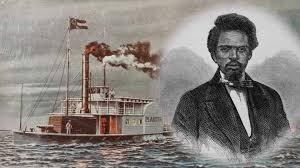
13 May DARING CIVIL WAR ESCAPE “TEAMWORK, TONE, TENACITY” LEADERSHIP: ROBERT SMALLS
On this date in 1862, Robert Smalls freed himself, his crew, and their families from slavery during the Civil War by commandeering a Confederate transport ship, CSS PLANTER in Charleston harbor, and piloting it from Confederate-controlled waters to the U.S. blockade that surrounded it. He then sailed the ship to the Union-controlled enclave in the Beaufort–Hilton Head area, where it became a U.S. Navy ship and he was given command – the first African-American to command a USN ship in our nation’s history. His example and persuasion helped convince President Lincoln to accept African-American soldiers into the Union Army. Smalls’ amazing story and inspirational leadership style included:
- TEAMWORK: Docked on the Cooper River in Charleston, in the early morning hours with the Confederate crew sleeping ashore, Smalls gathered his family, the other enslaved crew and their families and headed toward the Atlantic. He donned the top hat and long coat of the Confederate captain. As the boat’s pilot, he knew the various codes executed with the ship’s whistle to get past the forts in the harbor. He calmly sailed past five forts in the harbor and to freedom aboard the USS ONWARD outside the harbor. As astonished Union officers boarded the PLANTER, Smalls stood at attention, saluted, and spoke: “I am delivering this war material including these cannons and I think Uncle Abraham Lincoln can put them to good use.” Smalls spoke with the Union Navy’s on scene commander, Admiral Du Pont (yes, Dupont Circle in Washington, DC is named for him!), who afterwards wrote to Secretary of the Navy Welles that “this man, Robert Smalls, is superior to any who has yet come into our lines, intelligent as many of them have been. His information has been most interesting, and portions of it of utmost importance. … I shall continue to employ Robert as a pilot on board PLANTER for inland waters.” So Smalls came back to fight in the war. As a result of bravery under fire, he became the first African American to command (as a Civilian) a USN ship, the newly re-designated USS PLANTER.
- TONE: When questioned about his political affiliation after the war, he defended his choice in this fashion, “[I am a member of] The Party of Lincoln which unshackled the necks of four million human beings”
- TENACITY: During the war Smalls was present during at least 12 combat engagements. After the war, Smalls returned to Beaufort, ran a successful retail store, then became a politician, winning election as a Republican to the South Carolina Legislature, and was later elected to five terms in the U.S. House of Representatives during the Reconstruction era. He founded the South Carolina Republican Party and authored state legislation providing for first free and compulsory public school system in the U.S.
Extraordinary is an overused word, but not in the case describing Robert Smalls’ life, character and accomplishments. He was a trailblazer for African Americans and an inspiration to all Americans. In 2017, the Reconstruction Era National Historical Park in Beaufort County, SC, was established (just a few blocks from Smalls’ home and final resting place) with emphasis on the significance of Robert Smalls to our American national heritage.
– Rear Admiral Paul Becker, USN (Ret) is a leadership professional. He is a leadership professor at the U.S. Naval Academy and the CEO of The Becker T3 Group, a platform for his motivational and national security keynote speaking. A former Naval Intelligence Officer, he’s successfully led large, diverse, high-performing teams afloat and ashore in peace, crisis and combat. In 2016, The Naval Intelligence Community established “The Rear Admiral Becker ‘Teamwork, Tone, Tenacity Award for Leadership” in his honor.

Sorry, the comment form is closed at this time.